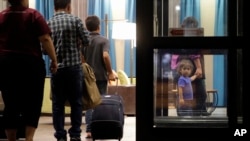In June 2018, family separations at the U.S.-Mexico border made international headlines after audio emerged from a federal detention facility showing scores of sobbing children packed together, screaming for their parents.
Though news of the separations came to light in 2018, a pilot program had started in 2017 in the El Paso, Texas, area.
Five years later, of the more than 5,000 children who, court documents say, were separated from their parents under former President Donald Trump’s zero-tolerance policy for unauthorized border crossers and those who presented themselves legally at ports of entry, about 180 children have yet to be reunited with their parents. Many of those parents were expelled from the United States, an immigration attorney told VOA.
Some of the children are in foster care; others are with relatives they had never seen before.
Lawyers with the American Civil Liberties Union believe the number of children yet to be returned to their parents is much higher.
“We believe that more than 1,000 families are still not reunited,” Lee Gelernt told VOA. He’s the lead ACLU attorney who sued to stop the Trump administration policy and represents separated families suing the U.S. government for damages and other types of relief.
“I’ve been doing this work for 30 years, and this is by far the worst thing that I have ever seen,” he said. “We’re talking about really a historic wrong by this country because it wasn’t an accident. It wasn’t a few mistakes. It was a deliberate policy at the highest levels of the United States government sitting down and saying, ‘Let’s take children away from their parents so that the parents say, ‘Let’s just give up our asylum claims.’ And no one ever tries to come in.”
Task force
Within weeks of taking office in January 2021, President Joe Biden created an interagency task force “to reunite children separated from their families at the United States-Mexico border.”
The Department of Homeland Security announced in March 2021 that some of the families could be reunited in the United States and be allowed to stay. And DHS created websites in English, Spanish and other languages where separated family members could register for help.
Thousands of separated children have been reunited with their parents since 2017. But while the Biden administration points to progress, immigration advocates point to an effort they say continues to be hampered by logistical, legal and political hurdles.
In a December written statement, DHS told VOA the interagency task force “has made significant and important progress,” and as of March, a year since its creation, the task force, along with nonprofits, has reunited 147 children with their parents.
About 1,075 families have registered using the two DHS websites. Some are outside the U.S. waiting to be reunited, and some have been reunited and live in the United States.
Under the Trump administration, the process of reuniting the families began after a federal judge ordered the government to stop separations and reunite families within 30 days. The government missed the court’s deadline and most of the work was done by the ACLU and immigration nonprofits.
“We are just continuing to look for them,” Gelernt said. “It’s been now five years, and there are some children who haven’t seen their parents, in four years, four to five years. And so we’re in this horrendous situation where the children — some of them are so young — they don’t even really remember their parents.”
Migrants’ litigation
More than 20 lawsuits have been filed by migrants who were separated at the border.
Some want the U.S. to grant legal residence and continue mental health services to the families. Others seek payment for the harm, suffering and pain the zero-tolerance policy caused them and their minor children.
A nationwide class-action lawsuit represents parents separated from their children under the zero-tolerance policy. The parents are asking the U.S. government to grant them legal residence, a continuation of health care services, and money to compensate for the suffering they went through.
The class-action lawsuit, the ACLU’s Gelernt said, centers on an anonymous plaintiff referred to as Ms. L., who fled the Democratic Republic of the Congo with her daughter, who was 7 at the time, and arrived at the border between Mexico and California in November 2017.
“She had not crossed illegally. She had come to a port and said, ‘I’d like to apply for asylum.’ They still took her child away,” Gelernt said.
On Wednesday, The Washington Post reported on emails from 2018 in which former U.S. government officials discussed trying to slow the reunification of families. The emails were turned over as part of a court filing seeking records to support two lawsuits in the U.S. District Court in Arizona.
Under Trump’s zero-tolerance policy, Jeff Sessions, who was attorney general, and Kirstjen Nielsen, who was the DHS secretary, repeatedly said the government wanted to criminally prosecute migrant parents for illegally entering the country and that separating them from their children was an unfortunate consequence of that.
But lawyers in the Arizona cases, writing in their court filing, said new material supports their claim that the policy intended to deter migrants and inflict harm and that parents were separated from their children whether they “were prosecuted or even referred for prosecution.”
Settlement talks
Immigrant advocates say reuniting separated families isn’t enough and that reparation is needed for harm done.
Amid ongoing litigation, The Wall Street Journal reported in 2021 that the Justice Department was considering paying about $450,000 to each person affected by the zero-tolerance policy.
When reporters asked Biden in November 2021 about the possible $450,000 payments, he said: “That’s not going to happen.”
And last December, the government walked away from settlement talks, leaving both sides to litigate in open court.
“The biggest point where we’re still negotiating,” Gelernt said, is “is there going to be a pathway for them to remain permanently in the U.S. That’s where the negotiations are. … We hope the Biden administration will come back to the negotiating table for the money, but right now, there’s no sign of that. On everything but the money, the administration is negotiating with us.”
Congress could also pass legislation to facilitate families’ permanent status in the United States, he said.
“We’re talking about a relatively small number of families, 5,500 families or maybe more than that, but not so many relative to other numbers we hear thrown around in immigration. And we are talking about something that was a historic moral stain on us,” he said.
So far, Congress has not voted on any bills to help families that were separated under the zero-tolerance policy.
“Right now, the pathway is through these negotiations,” Gelernt said.


